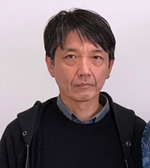La Follia d'amore: Difference between revisions
WillIdleAway (talk | contribs) m (link to gamelan's traditional musical scales) |
WillIdleAway (talk | contribs) (describing what the track does and leading off the second paragraph with Ishikawa-bushi) |
||
| Line 10: | Line 10: | ||
==Composition== | ==Composition== | ||
[[File:Jun Ishikawa.png|thumb|left|150px|The composer of "La Follia d'amore", Jun Ishikawa, was concerned that it was too silly and not accurate to real-life gamelan, but was assured otherwise by director Shinya Kumazaki.]] | [[File:Jun Ishikawa.png|thumb|left|150px|The composer of "La Follia d'amore", Jun Ishikawa, was concerned that it was too silly and not accurate to real-life gamelan, but was assured otherwise by director Shinya Kumazaki.]] | ||
"La Follia d'amore" is one of five tracks generally associated with Hyness and the altar room of the [[Divine Terminus]]. It is composed in the style of [[wikipedia:gamelan|gamelan]], and the instrumentation consists of metallophones, a bowed string instrument, and a bassoon. | "La Follia d'amore" is one of five tracks generally associated with Hyness and the altar room of the [[Divine Terminus]]. It is composed in the style of [[wikipedia:gamelan|gamelan]], and the instrumentation consists of metallophones, a bowed string instrument, and a bassoon. After a foreboding, mostly gamelan-like seven-second introduction, the track kicks into an energetic ''allegro'' beat of around 165 bpm, featuring heavy percussion and bass and combining frenetic string and gamelan melodic lines. Past the one-minute mark, the song becomes increasingly electronic, then slows to a leisurely ''andante'' pace of around 85 bpm. After maybe a half-minute reprieve, the song loops back to the high-energy beat of the start. | ||
In a sound staff roundtable discussion included in the ''[[Kirby Star Allies: The Original Soundtrack]]'' booklet, [[Shinya Kumazaki]] considers this track to embody Ishikawa's style of music (石川節 or ''Ishikawa-bushi'', literally meaning "Ishikawa-tune"), surging with his sensibilities and sense of vitality and energy. The same discussion reveals that Jun Ishikawa was initially anxious about composing this track and [[Puppet Offering|its sister track]]. Kumazaki had requested a "gamelan-like song", but Ishikawa felt bound by the limitations of gamelan's [[wikipedia:slendro|musical]] [[wikipedia:pelog|scales]] and its origins as a musical form associated with Indonesian religious rituals. When he consulted Kumazaki in effect whether he could deviate from this traditional form, Kumazaki responded, "If a real gamelan player hears this, and they think, 'Oh, was that supposed to be gamelan?', that's fine." Ishikawa was relieved after this, and continued composing without worrying about the limitations. [[Hirokazu Ando]] also joked that he was worried when he saw that Kumazaki requested a gamelan song, and was relieved that it didn't fall to him. | |||
{{clear}} | {{clear}} | ||
Revision as of 02:59, 3 March 2023
| ||||||||||
|
| ||||||||||
"La Follia d'amore"[2][Japanese title] is the theme for the first phase of Hyness's boss battle. It first appeared in Kirby Star Allies and was composed by Jun Ishikawa.[1]
Composition
"La Follia d'amore" is one of five tracks generally associated with Hyness and the altar room of the Divine Terminus. It is composed in the style of gamelan, and the instrumentation consists of metallophones, a bowed string instrument, and a bassoon. After a foreboding, mostly gamelan-like seven-second introduction, the track kicks into an energetic allegro beat of around 165 bpm, featuring heavy percussion and bass and combining frenetic string and gamelan melodic lines. Past the one-minute mark, the song becomes increasingly electronic, then slows to a leisurely andante pace of around 85 bpm. After maybe a half-minute reprieve, the song loops back to the high-energy beat of the start.
In a sound staff roundtable discussion included in the Kirby Star Allies: The Original Soundtrack booklet, Shinya Kumazaki considers this track to embody Ishikawa's style of music (石川節 or Ishikawa-bushi, literally meaning "Ishikawa-tune"), surging with his sensibilities and sense of vitality and energy. The same discussion reveals that Jun Ishikawa was initially anxious about composing this track and its sister track. Kumazaki had requested a "gamelan-like song", but Ishikawa felt bound by the limitations of gamelan's musical scales and its origins as a musical form associated with Indonesian religious rituals. When he consulted Kumazaki in effect whether he could deviate from this traditional form, Kumazaki responded, "If a real gamelan player hears this, and they think, 'Oh, was that supposed to be gamelan?', that's fine." Ishikawa was relieved after this, and continued composing without worrying about the limitations. Hirokazu Ando also joked that he was worried when he saw that Kumazaki requested a gamelan song, and was relieved that it didn't fall to him.
Other appearances
Are there even any other appearances??? not sure
Names in other languages
| Language | Name | Meaning |
|---|---|---|
| Japanese | ラ フォッリア ダモーレ[3] ra forria damōre |
La Follia d'amore (transliteration) |
References
[[Category:Music in Kirby Star Allies]]
